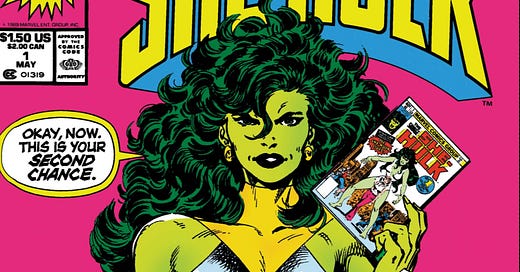Just a short follow-up to my criticisms of She-Hulk: Attorney at Law now that the final episode has dropped, and then I’ll be all tapped out on this subject. I’m posting this as web-only instead of emailing in case people are getting sick of hearing about the show. I’ve reached that point myself, but had to get a few more thoughts out …
SPOILERS!
The finale had its amusing moments, my favorite being the parody of the original Incredible Hulk TV opening. Unfortunately, though, the episode did not improve my opinion of the series.
The main issue is not that the show completely shattered the fourth wall; the issue is how shattering the fourth wall affected events.
Yes, in the comics, characters would stop by the Marvel Comics offices once in a rare while. I never liked this trope, which dates all the way back to Fantastic Four #10 (1963). It yanks me right out of the story. But the comics later established an in-story reason for the Marvel offices and staff to appear in the books (the Fantastic Four and others license their “real-life” adventures to Marvel for publication). So, having She-Hulk stop by the writers room can be seen as a nod to the comic book tradition.
The scene with the A.I. Kevin Feige almost addresses my concern about the comedy’s lack of self-deprecation. However, the scene is self-deprecating about the MCU generally, not about She-Hulk as a character. So the “pointing-and-laughing” issue remains.
Most egregiously, though, She-Hulk’s conversation with “Kevin” winds up revising the story on the spot, and She-Hulk returns to an altered set of circumstances that she’s able to bring to a speedy resolution. This effectively creates a magical solution to the plot, even if there’s some explanation for why this solution can never be replicated. From then until long after the credits finish, a certain pointlessness lingers in the atmosphere.
The scene could have worked if it led to She-Hulk realizing something about herself or reaching a decision about what she needed to do, and then she returned to exactly the same time and set of circumstances from which she had left. That way, the fourth-wall break could have represented Jen’s thought process—her peculiar way of working out the problem and figuring out what she needed to do—as opposed to events that definitely happened.
That might have been interesting. That might have integrated the meta gimmick and the character, making it an organic part of the story rather than something that (quite literally) pulls She-Hulk out of her own story.
And it wouldn’t have broken the universe. When you share a universe, everyone must share the same set of rules. Sharing is caring, as the saying goes.
I won’t let my disappointment in She-Hulk: Attorney at Law ruin my enjoyment of the comic books, though. If you’re interested in diving into She-Hulk comics for the first time, I suggest skipping the first series, The Savage She-Hulk, and starting no earlier than when she joins the Avengers in Avengers #221 (1982). The best was yet to come, though.
When done right, She-Hulk is an excellent character.
I write superhero novels. Click the button below to take a look (and thank you to everyone who already has!).







Why did you suggest skipping Savage She-Hulk? I agree it's not the current tone of the character but I think Stan's origin issue is worth reading and I think the series has a few good moments here and there after that.